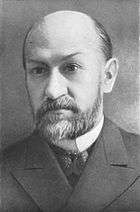Vasily Bartold
Vasily Vladimirovich Bartold (Russian: Васи́лий Влади́мирович Барто́льд, Polish: Wasilij Władimirowicz Bartołd, German: Wilhelm Barthold,[1] also known as Wilhelm Barthold; 15 November [O.S. 3 November] 1869 – 19 August 1930) was a Russian Empire and Soviet historian of German descent who specialized in the history of Islam and the Turkic peoples (Turkology).
Vasily Bartold | |
|---|---|
 | |
| Born | 15 November 1869 |
| Died | 19 August 1930 (aged 60) |
| Nationality | Russian |
| Occupation | Historian |
Bartold's lectures at the University of Saint Petersburg were annually interrupted by extended field trips to Muslim countries. In the two volumes of his dissertation (Turkestan down to the Mongol Invasion, 1898-1900), he pointed out the many benefits the Muslim world derived from Mongol rule after the initial conquests. Bartold was the first to publish obscure information from the early Arab historians on Kievan Rus'. He also edited several scholarly journals of Muslim studies, and contributed extensively to the first edition of the Encyclopaedia of Islam. In 1913, he was elected to the Russian Academy of Sciences. In February 1917 he was appointed to the Commission for the Study of the Tribal Composition of the Population of the Borderlands of Russia.
After the Russian Revolution, Bartold was appointed director of the Peter the Great Museum of Anthropology and Ethnography, a post he held from 1918 to 1921. He wrote three authoritative monographs on the history of Islam, namely Islam (1918), Muslim Culture (1918) and The Muslim World (1922). He also contributed to the development of Cyrillic writing for the Muslim countries of Central Asia.
Most of his writings were translated in English, Arabic, and Persian. Bartold's collected works were reprinted in 9 volumes between 1963 and 1977, and whilst Soviet editors added footnotes deploring his 'bourgeois' attitudes, his prestige was such that the text was left uncensored, despite not conforming to a Marxist interpretation of history. Some of his works have been reprinted more recently in Moscow.
Works (selection)
- (in Russian) «Улугбек и его время» Ulugh-Beg (Leyden: 1918)
- (in German) "Ulug Beg und seine Zeit". In Abhandlungen für die Kunde des Morgenlandes 21, No. 1, (Leipzig:Brockhaus) 1935, ISSN 0567-4980 (Trans. Walther Hinz)
- (in English) Ulugh-Beg, Leyden, 1958
- Turkestan Down to the Mongol Invasion (London: Luzac & Co) 1928 (Trans. T. Minorsky & C.E. Bosworth) (in English)
- 'Mussulman Culture,' 1934. (in English)
- (in English) "A Short History of Turkestan" (1920). In Four Studies on the History of Central Asia (Leiden: E.J. Brill) 1956 (Trans. V. & T.Minorsky)—Substantial excerpts of vol. 2, 1962
- (in English) An Historical Geography of Iran (Princeton: Princeton University Press) 1984 (translated by Svat Soucek; edited by C.E. Bosworth)
- (in Russian) Собрание сочинений (Москва: Издательство Восточной литературы) 1963-77 9 Vols.—Complete works
- (in Russian) Отчет о поездке в Среднюю Азию с научною целью (С.Пб.: Тип. Имп. Академии Наук) 1897
- (in Russian) История культурной жизни Туркестана (Москва: Изд. Академии наук СССР) 1927
- (in Russian) Работы по исторической географии (Москва: Изд. фирма «Восточная литература» РАН) 2002
Notes and references
- The following spellings can be found: Vasilij V. Bartolʹd, Vasilij Vladimirovič Bartolʹd, Vasilij Bartolʹd, Vasilij Vladimirovič Bartolʹdu, Wilhelm Barthold, W. Berthold, Wīlhilm Bārtuld, Vasilij Vladimirovič Barthold, V. V. Barthold
| Preceded by Vasily Radlov |
Director of the Peter the Great Museum of Anthropology and Ethnography 1918–1921 |
Succeeded by Yefim Karskiy |